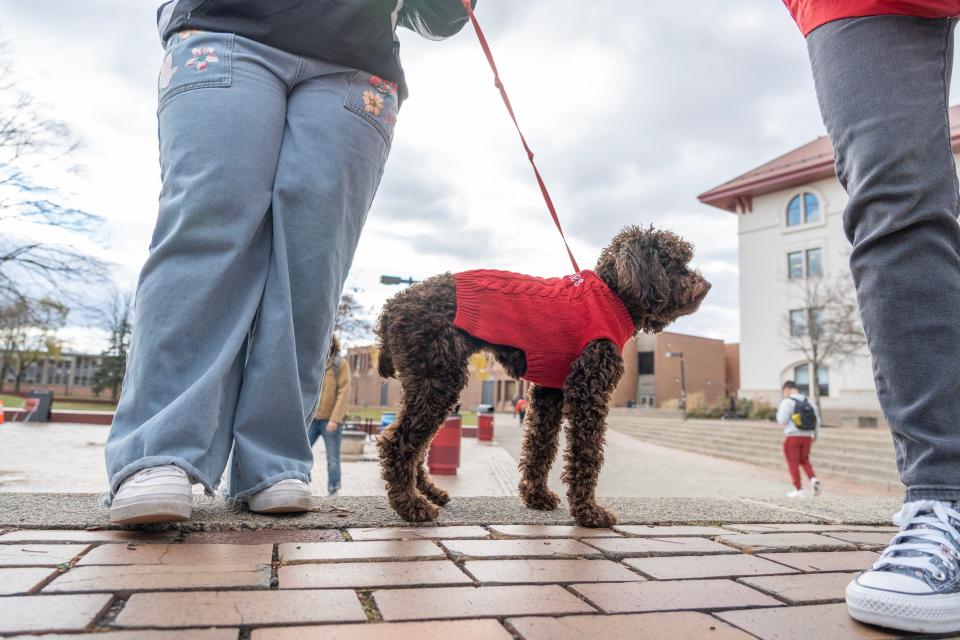Who lives in NJ college dorms these days? Cats, dogs, gerbils, rabbits. But no tarantulas
Frank Kouadio couldn't bear to leave his cat, Cléo, at his Maryland home when it was time to move to Ramapo College's campus last year after taking online courses during the pandemic.
So Cléo traveled with Kouadio to Mahwah.
Kouadio requested a letter from a therapist saying his gray-and-white tabby is an emotional support animal who eases his anxiety. Cléo has now lived for more than a year in a dormitory with Kouadio and three other suite mates, a living arrangement unheard of at most college campuses a decade ago but now gaining popularity.
Pets have long comforted those with anxiety, depression, phobias or other mental health issues, and under the Fair Housing Act, owners have a right to live with their emotional support animals anywhere — including dormitories — so long as a clinician signs off on it.
Story continues after photo gallery.
A 2014 court ruling determined that colleges must comply with the act, leading to a flood of requests by students. The numbers have increased at most schools since the COVID-19 pandemic and the social isolation that came with it.
"The generation going into college finished high school in their bedrooms," said Mindy Altschul, assistant vice president for Clinical Quality at the Carrier Clinic, one of the largest mental heath centers in New Jersey. "This was a completely upside-down world, and I can completely understand the greater need for companionship."
Colleges getting used to the logistical challenges
It's often a logistical challenge for school staff to accommodate an emotional support animal, but it's becoming more familiar.
Potential roommates have to be OK living with a pet. Students with animals can't be segregated to a particular dorm under federal law. Schools can't charge a larger room deposit or do more inspections, but any damage that occurs from an animal must be paid for by the student just as if the student did the damage.
More: Can landlords bar emotional support animals? Not in NJ, attorney general says
More: The right to an emotional support dog: Hackensack woman fights for her service animals
Emotional support animals are not service animals, such as dogs that help blind people navigate in public. Service animals have the right to accompany their owners almost everywhere they go.

Emotional support animals, however, are only legally allowed in their owner's dwelling and most common areas. So on college campuses, they are not allowed in most other buildings, such as the cafeteria, gym or classrooms. And unlike service animals, emotional support animals don't necessarily have any behavioral training. Many have never lived in high-density housing like a dorm.
"When this started to explode, people thought it’d be a zoo, but it never evolved into that," said Dawn Meza Soufleris, Montclair State University's vice president for student development and campus life. "Occasionally there’s a story of a dog nipping someone or a cat peeing on a bed, but they’re very rare."
Dogs, cats, gerbils, rabbits and birds, but no tarantula
Montclair State has about 25 emotional support animals in dorms each year, mostly dogs, cats, gerbils, rabbits and birds. One student requested permission to bring his tarantula to live on campus. Administrators declined because it was a spider.
Despite the tarantula denial, it has gone so well that Montclair State is training a little labradoodle named Pebbles to be an emotional support dog for all students.

Right now she is a school mascot — actually, her official title is "pupscot" — and when she is walked around campus she often draws a crowd. With the right training, though, "she can be brought to students if there is a crisis," Soufleris said. "Right now, she is a magnet. The students come running when they see her."
Comedians often poke fun at emotional support animals on late-night television. Some cultural critics say it's a softening of the sort of mental fortitude that students will need when they enter the real world. There are often stories in the press of someone going to extremes — such as the passenger who took an emotional support turkey on an airplane — that provide fodder for criticism, disdain and eye-rolling.
Undeniable clinical benefit
But therapists say there is an undeniable clinical benefit. The right animals can have an enormous calming effect on people in distress or at a low point in their days or lives.
For decades, animals have been brought to nursing homes, where they can liven the mood. Placing a lap cat on a resident even with dementia often elicits a joyful response.
The effect is the same with young people. Genesis Siverio has lived with her emotional support animal — a bunny named Thumper — for two years at Ramapo College, where she is the graduate resident director. Thumper does not live in a cage and is able to move around Siverio's single room. Thumper is fed a steady diet of hay and leafy greens along with fruit. Bananas are a favorite.
"Just sitting with her relieves my stress and anxiety, makes me feel loved and comforted without judgment, and reminds me of my worth as a living, breathing person," said Siverio, 22. "Thumper was a rescue, and without me, she would not have made it. I wouldn’t have made it this far without her, either."
Pet adoptions skyrocketed during the height of the COVID-19 pandemic in large part because people wanted a companion through some tough times. One in five American households adopted a dog or cat during that time and have kept them, according to the ASPCA.
The Carrier Clinic built a barn on its campus in 2016 with horses and farm animals so patients could spend time with them. Like nursing homes, it also has dogs visit every week to comfort patients.
"Sometimes therapy can be tough," said Altschul, of the Carrier Clinic. "This is a non-stressful, non-demanding time that can be soothing. An animal is not asking any questions — just giving pure companionship. I don’t want to say all patients come back elated, but it shifts something in them to get out of themselves."
The issue has led to numerous websites offering emotional support animal letters, often with little clinical insight into the request.
"You open up the internet and it’s $99 to get a letter for an emotional support dog," said Altschul, a licensed social worker, who has written letters for patients wanting pets in condo complexes that bar them. "That has the potential to shortchange folks who really need this, who are working with mental health professionals to get better."
Not comfortable with bearded dragons
Frank Kouadio is one of 31 students at Ramapo this fall with emotional support animals. The school accepts most requests with a therapist's letter but has drawn a line at some more exotic pets, said David Nast, who handles such requests as director of the Office of Specialized Services.
He has turned down requests by students to bring bearded dragons because the lizard needs a heat lamp that's against fire codes, needs to be fed insects that the school fears may cause an infestation and can spread disease.
"People will swear by their bearded dragons, but we’re just not comfortable," Nast said.
Kouadio said life with Cléo on campus has gone fairly smoothly. They live in a suite with three other students, each with their own room. Cléo spends plenty of time in the common area, where visitors play with her.
Of course, she can get bored, and Cléo will sometimes seek attention from Kouadio at inopportune times — like when he's on deadline for a term paper. "We annoy each other, to be honest," he said with a laugh.
But most of the time, she acts as a salve to the daily grind, and especially during finals week this past semester.
"I’d walk in all stressed and she would look at me and know it," he said. "Then we'd spend some time together and those feelings of pressure and anxiety go away."
This article originally appeared on NorthJersey.com: Have an emotional support animal? Bring it to college in NJ

